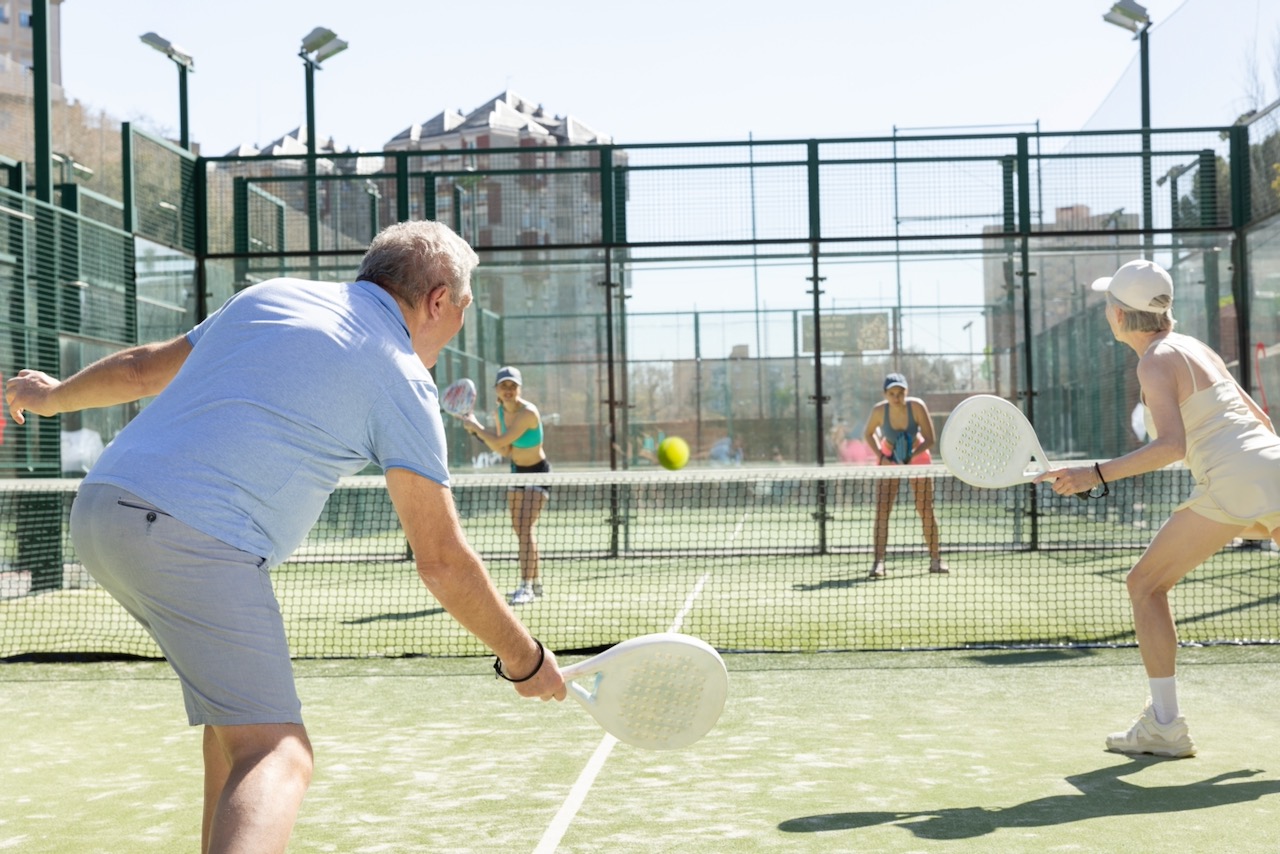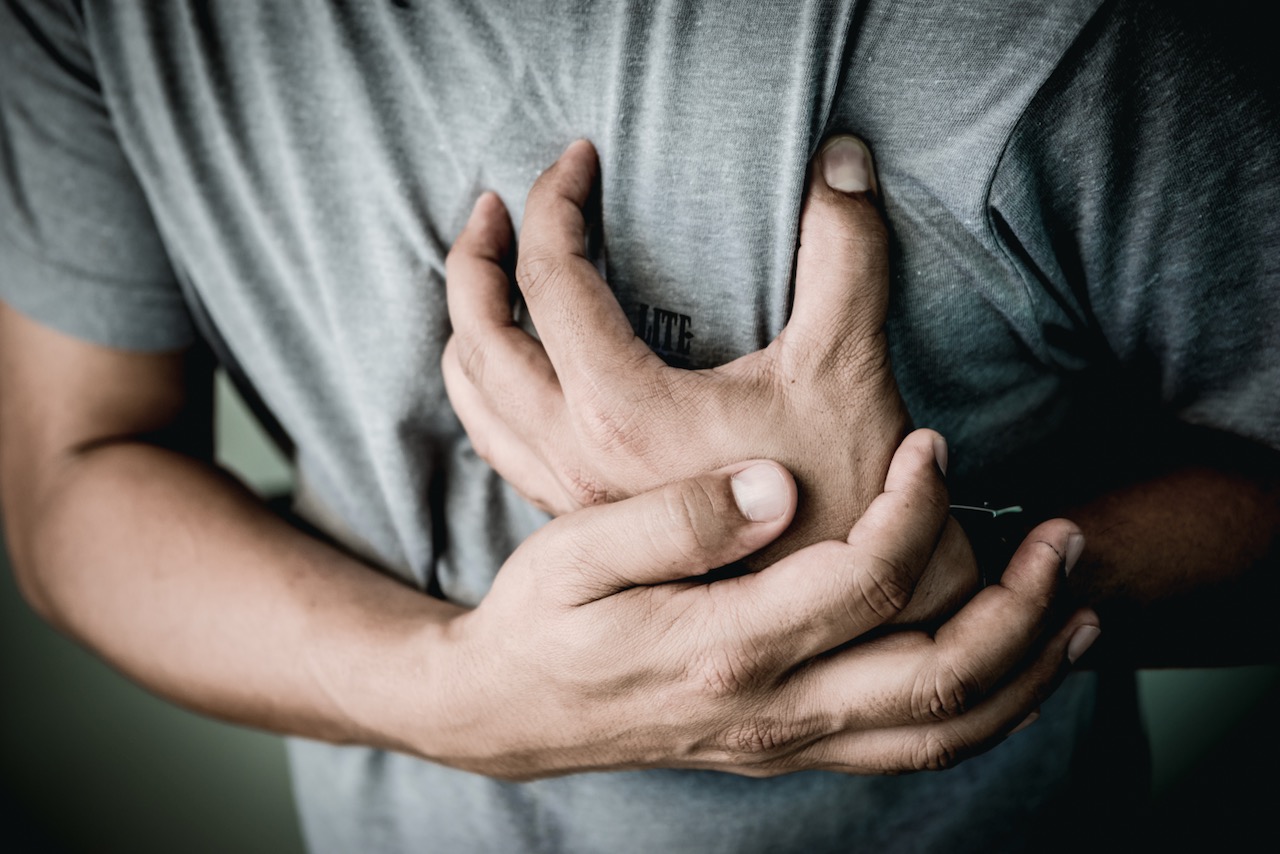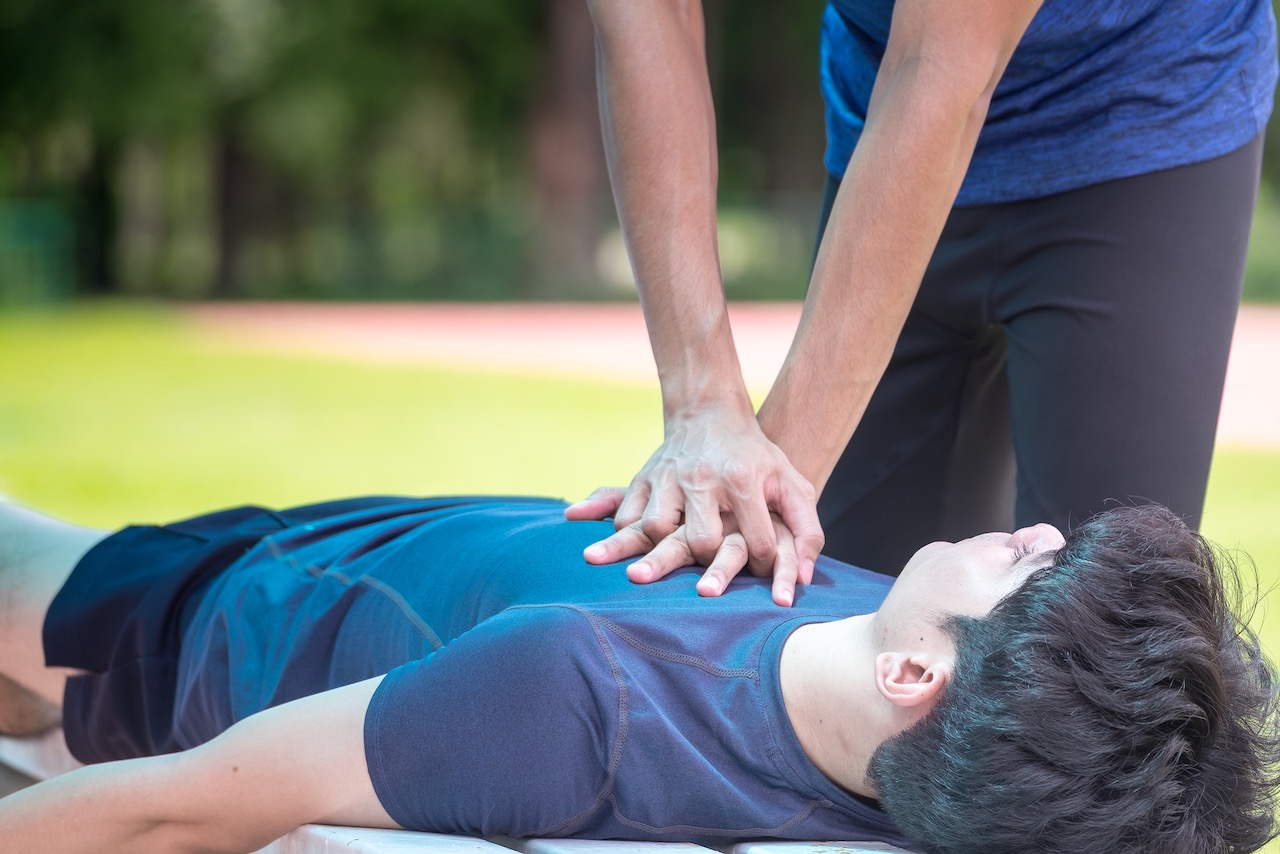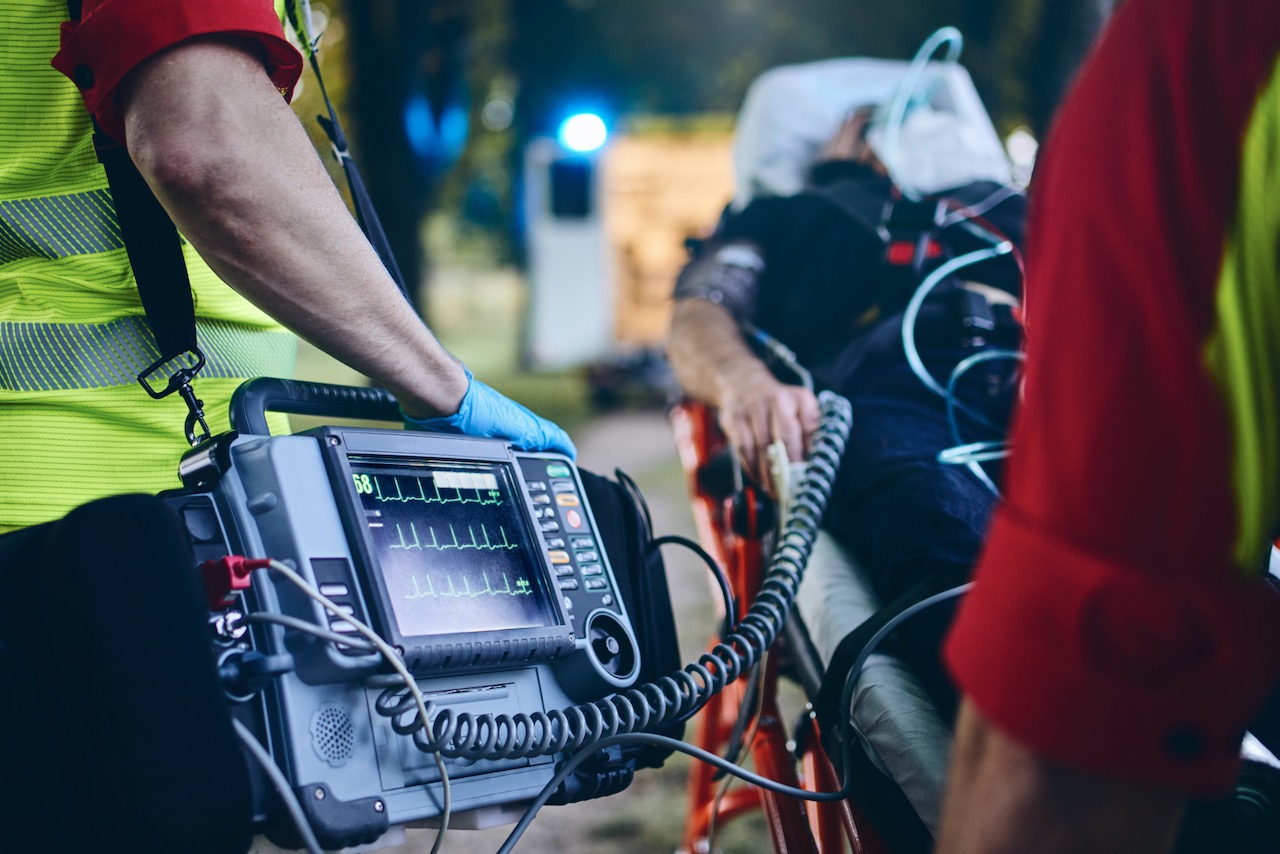Real-life experiences can be an invaluable tool for potential future first responders. While there is no substitute for in-person training and real-life experience, firsthand accounts of emergency situations provide unique insights into decision-making, problem-solving, and the emotional resilience required in high-pressure scenarios. These narratives can help future first responders understand the complexities of real-world emergencies, prepare for unexpected challenges, and develop a deeper appreciation for the critical role they will play in saving lives and ensuring public safety.
This example of a real-life emergency situation takes us to Spain where the patient, Jorma, collapsed during a weekly sports gathering. An Emergency First Responder, Joanne, stepped in to become a key link in the chain of survival. Keep reading to find out what happened.

A group of friends were enjoying a game of padel, and a sports facilities staff member was going about their usual duties.
Jorma Sakari Haritonov, a 67-year-old man in good shape, was playing his bi-weekly game of padel. Previous to the day, Jorma had not been diagnosed with any significant heart issues. He told us, “I have had small rhythm disturbances in my heart all my life. They have been examined, but the doctor has found them to be harmless.”
Additionally, Jorma is an ex-rescue and emergency clinic worker, which means he is a firefighter and paramedic. This wasn’t the first time he had been in an emergency situation — he’s just used to being the one providing aid.
Joanne Booth was working alone at the reception of the sports facility the day of the incident. She recalled, “I remember the weather was particularly hot that day and people were buying a lot of water.” In addition to a surplus in requests for water, the sports club was also slightly busier than usual.
In the weeks prior to the incident, Joanne had completed the Emergency First Response CPR & AED Course with Diving With Nic, a local PADI dive center.

During the game of padel, Jorma suddenly felt ill and collapsed to the ground.
Jorma started feeling unwell in the middle of a game. He remembered, “I felt sick. It felt like my blood pressure had dropped.” Responding to this sudden change, Jorma attempted to improve his situation by going to ground. However, as he dropped to his knees, he lost consciousness. While he remembers little from this time, he recalled, “I heard my friends who revived me talking, I even remember some of the words and know who they were.”
As Jorma continued to pass in and out of consciousness, a feeling of suffocation set in. When asked how he felt, he said, “I knew I was dead or dying. I felt no fear, no pain. The thought was that now it’s over.”
Joanne, still working in the reception area, recalls one man coming in and asking for some water. After fulfilling the request, she continued on with her work. She said, “It was quite a busy day. I gave him water and carried on working.”
Moments later, the same man returned with greater urgency and requested for an ambulance to be called. “I looked over at the padel court and saw a man lying on the floor surrounded by his friends.”

Friends, staff, bystanders and the local police stepped up to respond to the medical emergency which unfolded on the padel court.
As Jorma laid on the ground contemplating some of life’s biggest questions, he remembers the initial medical response came in the form of a force of breath entering his lungs. While offering a temporary reprieve, Jorma then lost consciousness for an extended period.
Around five to 10 minutes later, Jorma recalled coming around and saying, “I think I passed out.” After turning on his side and hearing that an ambulance was on the way, he responded, “I’ll rest a little and then everything will be ok.” Jorma then lost consciousness, and his heart stopped.
Jorma stated, “I did not see or experience anything supernatural during the event. Everything was very clear and rational. It would have been fun to meet St. Peter or someone else, but it didn’t happen.”
Joanne recalls handing the phone to the man who requested the ambulance. As he made the call to the emergency services, Joanne ran for the defibrillator situated in the nearby pool area.
When Joanne arrived at the padel court, she assessed the scene. She told us, “[Jorma’s] face was completely grey, and he was unresponsive. Another guy was clearing his mouth, (Jorma looked like he was swallowing his tongue) whilst breathing into his mouth.” Joanne observed an older gentleman administering CPR, but could see the technique was not correct.
So, Joanne took over.
“Once I started CPR, Jorma started breathing quite quickly but fell in and out of consciousness several times.” After repeating the CPR technique, two local police officers arrived at the scene. Joanne relinquished CPR control to the newcomers. However, after observing their CPR technique, Joanne chose to retake control once again. “I saw that their technique was also not correct, and in my opinion not enough force was being used,” said Joanne, recalling that “Jorma is not a small man.” During her recent EFR course, she learned how to effectively perform CPR. “I remember so vividly the force which needed to be used in order to reach the heart through the ribs.”
Joanne continued performing CPR until the emergency services arrived. Like many first responders, she was doing everything she could in the situation. She remarked, “I didn’t know if what I was doing was correct, but I carried on doing what I thought was the right thing to do.” During the wait, the two police officers allowed Joanne to focus on performing CPR by compiling Jorma’s details and forming an account of the incident, having them ready to pass on to the soon-to-arrive medical professionals.

Professional medical staff arrived at the scene, took over and transported the patient to hospital.
Jorma remembers regaining consciousness in the ambulance. He requested additional oxygen and became fully aware of the seriousness of the situation. After reuniting with his spouse, who had joined him in the ambulance, he offered the best comfort he could, “I told her I love her and the kids and if I die it’s alright.”
After relinquishing control for the last time, Joanne returned to the reception area to deal with another person ringing the reception bell with urgency. Thankfully, it was just a slightly impatient customer looking to purchase some water.
“Later that day I got the message to say that Jorma was sat up in bed talking in hospital. That was such a relief,” Joanne concluded.
The local police officers also got in contact the following day to ask how Jorma was doing.

Here’s what has happened since the incident.
“Now that two months have passed, I am fine,” Jorma said. His treatment included the placement of an internal defibrillator over his left pectoral muscle. This device will detect the absence of a heartbeat and stimulate it, if required. In addition, Jorma has to undergo a check-up with a doctor twice a year.
Jorma also commented to us that he may be even better than he was before his cardiac arrest. He has chosen to remove “everything that burdens the heart … such as caffeine, nicotine, stress, etc. Instead, I focus on more joy and love. In this way, the heart is not strained, and there are no extra beats or rhythm disturbance, which [was] the cause of this problem.”
Psychologically, the incident has also had an impact, “It is very difficult to say how this has affected me. The process is in progress. I’ve been searching and I’m finding a support group that has experienced the same thing. I think no one can understand other than the one who has the same experience.”
As for his rescuers, Jorma is aware of how lucky he was, “Fortunately, there were people in the group who knew immediately that my heart had stopped and I needed CPR, as well as calling 112 and a defibrillator.” Perhaps most importantly, Jorma pointed out, “I’m alive and my brain and whole body is fine just because of the basic CPR performed by these ordinary people.”
Reflectively, Jorma offered these final words, “Your task is to live well the life you were given by chance.”
This real-life account of a medical emergency highlights the potentially life-saving importance of being first aid and CPR-trained. If you’ve been inspired to make a difference, consider taking a CPR course. Find one near you by clicking below.
Share This